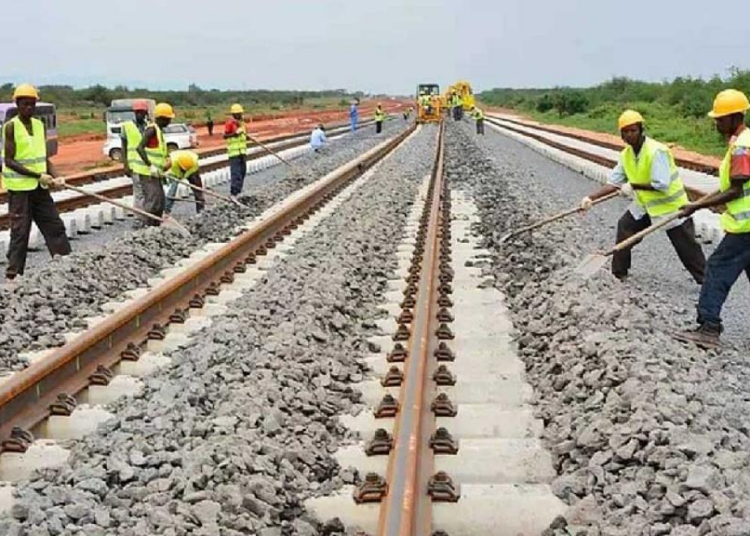
The Nigerian Railway Corporation (NRC), on Thursday, raised the alarm that railway assets inside the Apapa Port have been vandalised by unknown persons.
Speaking during a one-day stakeholders sensitization summit, titled, “Limitations To Rail Transportation of Cargo In Nigeria”, organised by the Nigerian Shippers Council (NSC) in collaboration with the Nigerian Railway Corporation (NRC), the NRC director of Operations and Commercial Services, Akinwunmi Oshilowo, lamented that aside vandalisation, NRC locomotives faces challenges in accessing the ports due to too many trucks clogging the railway right of way inside the Apapa Bulk Terminal Limited (ABTL), section of the Apapa Port.
According to the NRC Director of Operations and Commercial Services, bringing locomotives into APM Terminals, Apapa is always a nightmare.
“There’s need for a little bit of clarity between rail and port jurisdiction because our locomotives keep having issues when coming into the ports around the ABTL terminal of the Apapa Port, we don’t have enough marshalling yards inside the ports, bringing our train locomotives into the APM Terminals in Apapa is always a nightmare.
“The corridor through which we navigate into the ports, which is located at ABTL terminal, is too narrow and always congested with trucks but, our train locomotives have had several accidents along this corridor, mostly colliding with trucks while trying to access the ports. This is greatly hampering rail services at the ports and we hope the Shippers Council can help find a lasting solution to this issue.”
“Another area we hope the relevant authorities can help us look into is the persistent vandalisation of Railway assets right inside the ports because this is one of the major reasons why we have not been able to access GDNL line which is at the quayside of the port, there is persistent vandalisation of our assets inside the ports.
“A lot of our assets, including the railway track asset that connects to the quayside of the port have been heavily vandalised, anytime we repair these vandalised sections of railway assets inside the ports, they are vandalised again. Its quite frustrating and we hope the relevant authorities can help us look into this issue,” NRC director of operations stated.
Speaking earlier, the executive secretary of the Council, Barrister Pius Akutah, lamented lack of a functional rail evacuation of cargoes at Nigerian ports.
Akutah stated that the absence of rail evacuation of cargoes has resulted in congestion at the seaports, delay in off-loading of vessels, turnaround time, payment of demurrage, increase number of trucks and tankers on the road, traffic gridlock and high cost of doing business.
“Nigerian Railway Corporation (NRC) as a dependable ally is vested with the authority to manage the Public Rail Infrastructure, and to provide rail services and facilities for the carriage of goods and passengers. In line with their statutory mandates therefore, the Port Economic Regulator, the Shippers Council and the NRC are desirous of collaborating with the aim of ensuring and facilitating the efficient carriage of cargoes from the Seaports to the Inland Dry Ports (IDPs).
“The Council’s initiative through closed Inter-Agency collaboration, particularly with the Nigerian Railway Corporation (NRC) is with a view to ensuring: Enhanced intermodal connections and connectivity; Fast-track delivery of cargoes to and from Inland Dry Ports (IDPs) in Nigeria,” he stated.
He continued, “Cheaper and cost-effective means of transportation of goods to the hinterland and specifically, the IDPs located at the hinterland; Facilitation of the development of critical transport infrastructure in the hinterland of Nigeria,
“We should note that rail transportation is efficient, economical, and safe, especially for long distances and carriage of large volumes of goods. It can also reduce greenhouse gas emissions and energy consumption compared with road transportation.”
The NSC boss, however, urged experts to deliberate extensively and come up with implementable resolutions that will enhance the delivery of cargoes from the seaports to the hinterland for maximum contribution to our economy.
“The lack of a functional rail system for evacuation of cargo from the seaports to various distribution centres to the hinterland has become a problem in the shipping industry and ease of doing business in Nigeria. This has resulted in congestion at the seaports, delay in off-loading of vessels and turnaround time, payment of demurrage, increased number of trucks and tankers on the road, traffic gridlock and high cost of doing business.
“It is therefore hoped that at the end of this programme, challenges impinging the transportation of cargoes to the hinterland (IDPs) would be identified and solutions proffered,” Akutah stated.
SOURCE: LEADERSHIP




